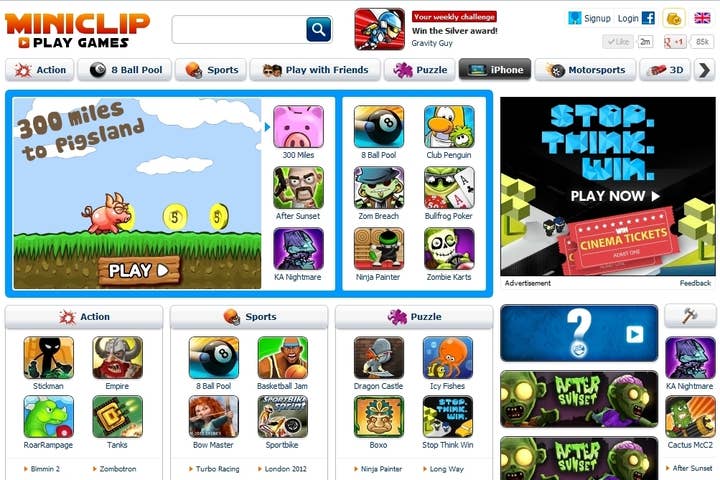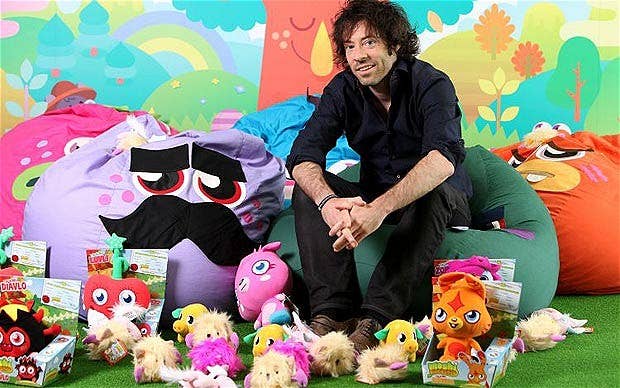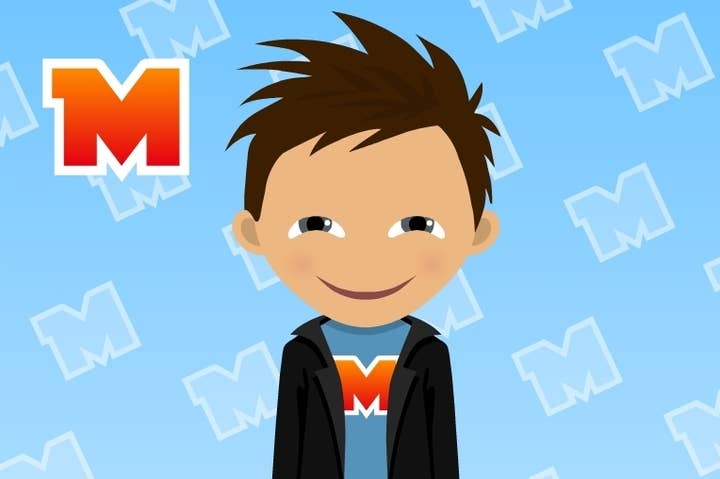From MiniClip to Mega Brand
CEO Rob Small on moving to mobile, facing the competition and turning down Facebook
"We're not a bunch of analysts who see the game space as an interesting window of opportunity - want to come in, build a business very quickly using someone else's money and sell it quickly before people can actually realise there's no substance behind it," says MiniClip CEO Rob Small, and frankly, it's hard to argue with him.
MiniClip was a casual gaming success story before we even used that term, a place where all types of gamer could go to find free games, from political satire to hardcore RPGs. It was launched in 2001 and since then has grown and grown, earning one of its founders a place on the The Sunday Times Rich List and over 200 million registered users.
But times, they are a-changing, and MiniClip's market is crowded like never before. Everyone from Zynga to League Of Legends are competitors, and all of them are touting their fancy business models as the next big thing. So how is the world's largest privately owned online gaming website dealing with that change? And why has the relatively simple game of pool turned out to be so important to the company? GamesIndustry International got CEO Rob Small and his head of games, Alexander Williams, on the phone from the company's headquarters in Switzerland to find out.

"In terms of scale we have about 100 million monthly active users across those platforms, and those 100 million users were all acquired through the same methods we used way back when we were setting the business up in the bedroom of the flat," says Small.
Small is cheerful, precise, and despite admitting that he feels like an old man, doesn't appear to have lost any of the enthusiasm that led him to to join forces with his friend Tihan Presbie and found the company fresh out of the University of Gloucestershire.
"We don't have a paid advertising model and we don't have any marketing executives in the company so all of that traffic is through word of mouth. We still believe wholeheartedly that investing money in building better games reaps far better rewards for us than buying users at some of these horrific prices that you hear in the industry now, I think up to $8 a user. Which is just not part of the DNA of our business."
The DNA of the business is deceptively simple, Small and his team are their own demographic. And while he is the first to suggest there are elements of luck and timing to the growth of the MiniClip empire, knowing the consumer inside and out has also been key.
"One thing we've been really focused on is we are big gamers ourselves, and the people that we employ are the very target audience that we try to appeal to so we feel like we understand the consumer very very well."
The company's headcount is around 165 currently, and then there all the developers that Williams liases with to provide the brand with its most important asset, the games. And MiniClip is open to working with anyone, from any country. As long as they're making quality games.
"We have in our catalogue of games about 900 in total, and Alex has over the years sourced almost all of those games, and those games have been some built internally, about 10-15 per cent built internally, the rest still sourced from developers all over the globe," says Small.
"If it's a 10 year old kid that's making an amazing game, then we're going to go with that game"
Alexander Williams
"From over 75 different countries now, but we probably, on an ongoing basis, are looking at about 30 different countries at any one time. We have about 80 or so games in the pipeline, in production, at any one time as well," adds Williams.
"We've always been strong believers that we don't want to work with people who are any one particular size and shape, we'll go wherever the talent is. And so for instance if it's a 10 year old kid that's making an amazing game, then we're going to go with that game."
(Miniclip doesn't actually have a ten year old game developer on staff, but MiniClip does host the work of teenage developer Damien Clarke. He won a licensing deal with MiniClip, but being just 14 at the time needed his mum to act as signatory on the agreements).
It doesn't matter how many times you ask Small or Williams about their competition, the fact that free games are everywhere now, so much so that some days it's an effort to find one you can pay for, the revelation that their market is a little more crowded than it use to be doesn't have them quaking in their executive desk chairs.
"To be honest I guess we're a bit long in the tooth with this stuff because before Facebook it was MySpace, and then it was Bebo, there's always been competitors for us," says Small, and you can almost hear him shrugging through the phone line.
"And we're just competing for eyeballs online, ultimately, so it could be YouTube, it could be Facebook, it could be any of these sites."
In fact, MiniClip actually turned down the massive social network when it asked it to dance.
"Ironically very early on when Facebook was a very very small business we actually were talking to them about whether or not we would work with them to power the games part of that platform, and like all small businesses that are growing fast, we found it a very painful process to understand technically how we would go about doing that and we decided not to do that opportunity," reveals Small, adding with a laugh that in hindsight, that might not have been the best decision.
"But we felt that as an owner and an operator of our own platform, and our own users who are ultimately are very loyal to us as a brand it was a mistake for us to pick up all our content and just plonk it on to Facebook. We were just encouraging our users to leave our own platform and cannibalising our own growth."
So instead MiniClip spoke to the games team at Facebook and then simply took the best bits off the platform and used them to their advantage - the login system for the website and mobile games, the fan pages, and more recently for the company's latest flagship game, 8 Ball Pool. Williams gave GamesIndustry International the numbers.

"We currently have around 25 million monthly active users on there and about 3 million daily active users across those platforms. On Facebook alone that makes us 15th biggest by monthly active and 12th biggest by daily active. And as Rob mentioned earlier on that is without having spent any money on marketing or user acquisition at all."
The game has recently made the transition to mobile, where it's seeing around 150,000 in current users. Some of whom are more obsessive about the title than others.
"I think we have one guy that has played 50,000 games of pool, we did the numbers. We did the numbers and we worked out he spent something like 6 months playing, I'm talking 24 hours a day, 6 months of accumulated play time," says Small.
"It's interesting, because pool is the type of game which might seem fairly vanilla but it really is one of those evergreen games that people seem to find hugely addictive. So we see it as a game that's going to live for a long time for us."
He goes on to say the company has deliberately stayed away from the obvious games, the farming sims, the match-three games, explaining that the company still wants to focus on unique and innovative games, and then to use its own website to push users towards their mobile phones.
"There's a lot of very good mobile developers out there who can create some incredible games, but most of those mobile developers don't own their own customers. They're reliant on Apple or Google to feature them, or they're buying traffic."
"A lot of those big companies that were the poster children for social games are really struggling now"
Rob Small
"We're slightly unique because what we try to create is this strategy where we co-release our mobile and web games simultaneously, so we will actively drive users from our website into Android or iOS app stores. Give the user a nice, entirely free-to-play game on the web, and use that for marketing the entry point, if you like, to sell them into downloading the mobile version."
Mobile is important to the company, it first entered the market in 2009 and now sees it as a core of its business both in the present and the future. Small mentions again and again that he doesn't want to expose the company by focusing too closely on one element of casual gaming. Not after he's seen what's happened to those that have.
"A lot of those big companies that were the poster children for that industry, people like Playfish, are really struggling now. These things were so huge back in the day but they're all starting to lose their shine now, and that just tells us one message, which is just make sure we're not overexposed to any one particular platform or one of those revenue segments so that we can stand the test of time."
So right now MiniClip is expanding with mobile in mind, its studio in Portugal has more than doubled in size in the last 12 months and is still growing, but it's looking to broaden its reach to new territories. Asia, obviously but also emerging markets like India, Latin America, Russia, Indonesia where internet connectivity is one the rise and free, browser based games can find a happy home.
It's also currently in talks with a number of Asian game developers who have found success in their local markets, but could use the help and reputation of a large Western online gaming company to repeat that success abroad. Enter Rob Small.
"We're keen to be a kind of conduit to help those Asian businesses expand into Western markets. And obviously with our presence on the web and on mobile we can look to try and play that central point almost, to help them to do that. So Asia and the Far East is definitely a focus."
Mind Candy is also proving an inspiration, and given its massive success with Moshi Monsters there are worse examples to try and follow when it comes to finding new uses for successful IP.

"You can create the game as a launch platform to move into physical goods, toys, apparel, magazines and so we think we're pretty well placed to be able to do that with our own IP and also with other IP that companies might want to work with us on."
MiniClip has been around for 12 years, and has so far weathered the social gaming storms and free-to-play forest fires without too much trouble, it's hard to imagine that they'll be much that could stop it achieving another decade of growth now that everyone knows what casual gaming is.
"When you think about the move in social and obviously mobile now, everyone's a gamer. We've always believed it, but now everyone is a gamer and everyone is playing on different devices and that's super exciting."









